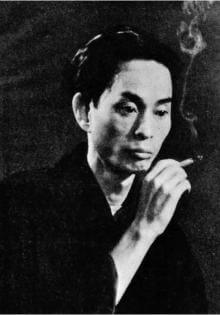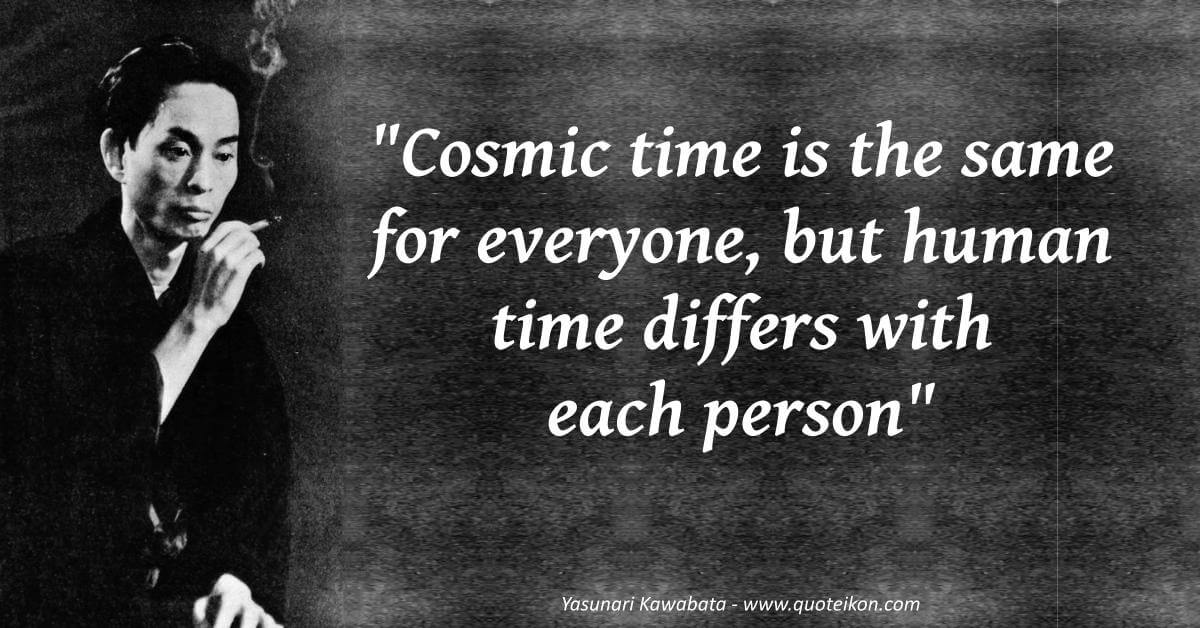
- Mini Bio
- Name: Yasunari Kawabata
- Born: 11th June 1899, Osaka, Japan
- Died: 16th April 1972, Zushi, Kanagawa, Japan
- Alma mater: Tokyo Imperial University
- Occupation: Novelist and short story writer
- Books: Some of his finest works are: The Dancing Girl of Izu (1926), Snow Country (1935), The Master of Go (1951), Thousand Cranes (1952), The Sound of the Mountain (1954) and The Old Capital (1962)
- Awards: In 1968 he became the first Japanese writer to receive the Nobel Prize for Literature
- Trivia: For all his lifestyle reservations and little interest in WWII he was fiercely proud of Japanese literature and made a considerable contribution to the translation of Japanese literature post WWII. Subsequently he was awarded the Japanese Order of Culture in 1961
"Put your soul in the palm of my hand for me to look at, like a crystal jewel. I'll sketch it in words..."
Yasunari Kawabata"How ever alienated one may be from the world, suicide is not a form of enlightenment. However admirable he may be, the man who commits suicide is far from the realm of the saint"
Yasunari Kawabata"My own works have been described as works of emptiness, but it is not to be taken for the nihilism of the West. The spiritual foundation would seem to be quite different"
Yasunari Kawabata"People have separated from each other with walls of concrete that blocked the roads to connection and love. and Nature has been defeated in the name of development"
Yasunari Kawabata"There can be no world of the Buddha without the world of the devil. And the world of the devil is the world difficult of entry. It is not for the weak of heart"
Yasunari Kawabata"Quiet praying, apart from discussing wrong or right upon Mishima's death, is a traditional emotion of the Japanese people"
Yasunari Kawabata"I feel as though I have never held a woman’s hand in a romantic sense.... Am I a happy man deserving of pity?"
Yasunari Kawabata"Among those who give thoughts to things, is there one who does not think of suicide?"
Yasunari Kawabata"Time flows in the same way for all human beings; Every human being flows through time in a different way"
Yasunari Kawabata"A masterpiece of a game can be ruined by insensitivity to the feelings of an adversary"
Yasunari Kawabata"Cosmic time is the same for everyone, but human time differs with each person"
Yasunari Kawabata"I suppose even a woman's hatred is a kind of love"
Yasunari Kawabata"Because you cannot see him, God is everywhere"
Yasunari Kawabata"The single flower contains more brightness than a hundred flowers"
Yasunari Kawabata"If there is a god, let him help me"
Yasunari Kawabata
Great quotes are not where you find great wisdom. It's where you share this knowledge that counts
Sharing Is Caring
Yasunari Kawabata Biography
Yasunari Kawabata was a thoughtful writer who with an imagination as wide as a Tokyo sunrise and a youthful exuberance for literary change set about to break free the pens chained to the old school of Japanese naturalism and open up new ideas for literature in 1920's Japan.
Kawabata was a founder member of the literary journal The Artistic Age that made its debut in 1924 and along with other young writers of that era they encouraged writers to explore new forms of expressionism in the form of perception that more pertinently is key to opening the mind to allow new sensations to be experienced.
They were the avant garde of Japanese literature and as Kawabata put pen to paper so his literary prowess began to slowly build. Yasunari often spoke about isolation being good for the soul and that self reflection can build ideas of beauty, however Kawabata was also prone to bouts of depression so shutting himself off from the world could have been a defensive strategy he subconsciously deployed.
It is easy to understand his defensive mindset when you consider all his close family died before he reached the age of 15. This sense of loss and of isolation brought him to the point in WWII where he suggested that WWII was one of the greatest influences on his work.
The death and the loss was evident in most families in 1940's Japan but the ironic thing was that his style of writing never really changed as it would be expected to do through a traumatic life changing war. Indeed it was almost as if he could relate to the family losses because he too had experienced complete family loss as a young boy and it haunted him throughout his life.
The 1950's decade was a time where Kawabata's writing really blossomed and came of age, this was a period when his writing hit its prime and his passion for Japanese literature pushed him to promote translations of the best of his peers work for worldwide consumption.
If you are that good for 50 years something has to give and in recognition of his amazing contribution to literature Yasunari Kawabata was awarded the 1968 Nobel Prize for Literature. He was one of epic Japanese writers of the 20th century who also liked a good one liner, so this is my compilation of 15 of the best Yasunari Kawabata quotes.
Quotes About Yasunari Kawabata
The author Kenzaburō Ōe gave this assessment: "Even as a twentieth-century writer Kawabata depicts his state of mind in terms of the poems written by medieval Zen monks. Most of these poems are concerned with the linguistic impossibility of telling truth. According to such poems words are confined within their closed shells"
John M. Lee writing in The New York Times described Kawabata's bemusement at his award: "His spare prose depicts Japanese emotions often impossible to translate into English, and he expressed perplexity over having won the Nobel Prize, saying that Japanese literature and tradition were so difficult for Westerners to understand"

